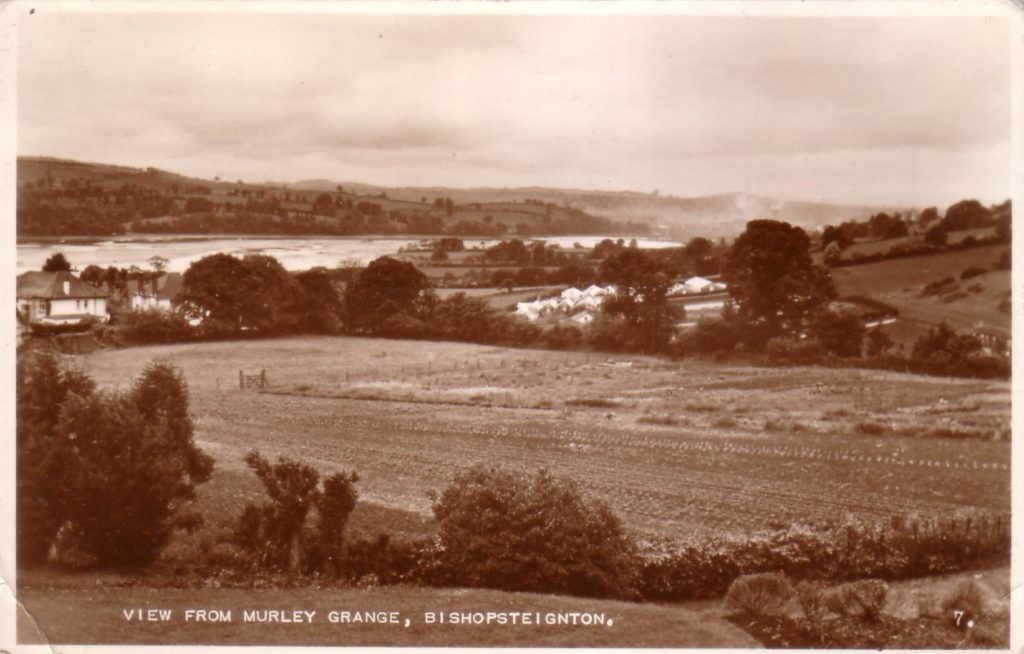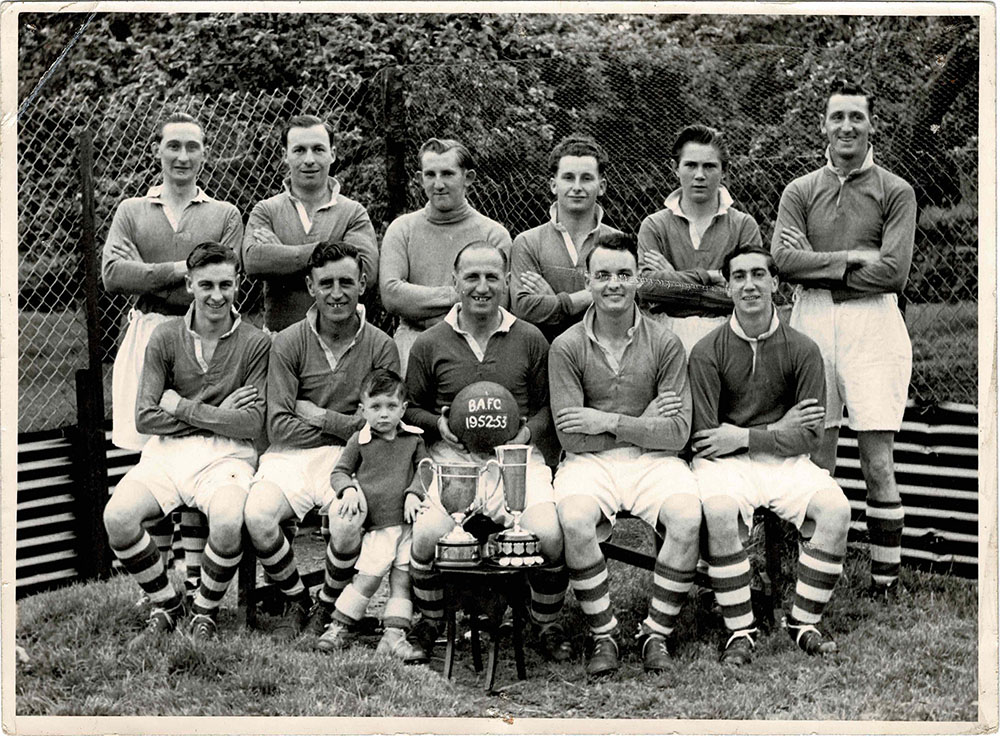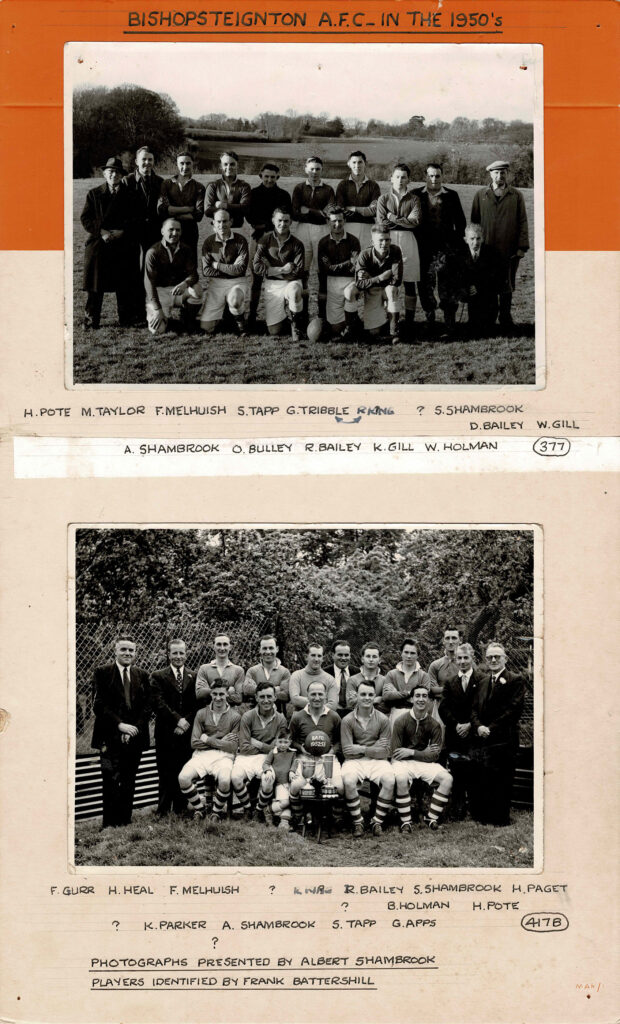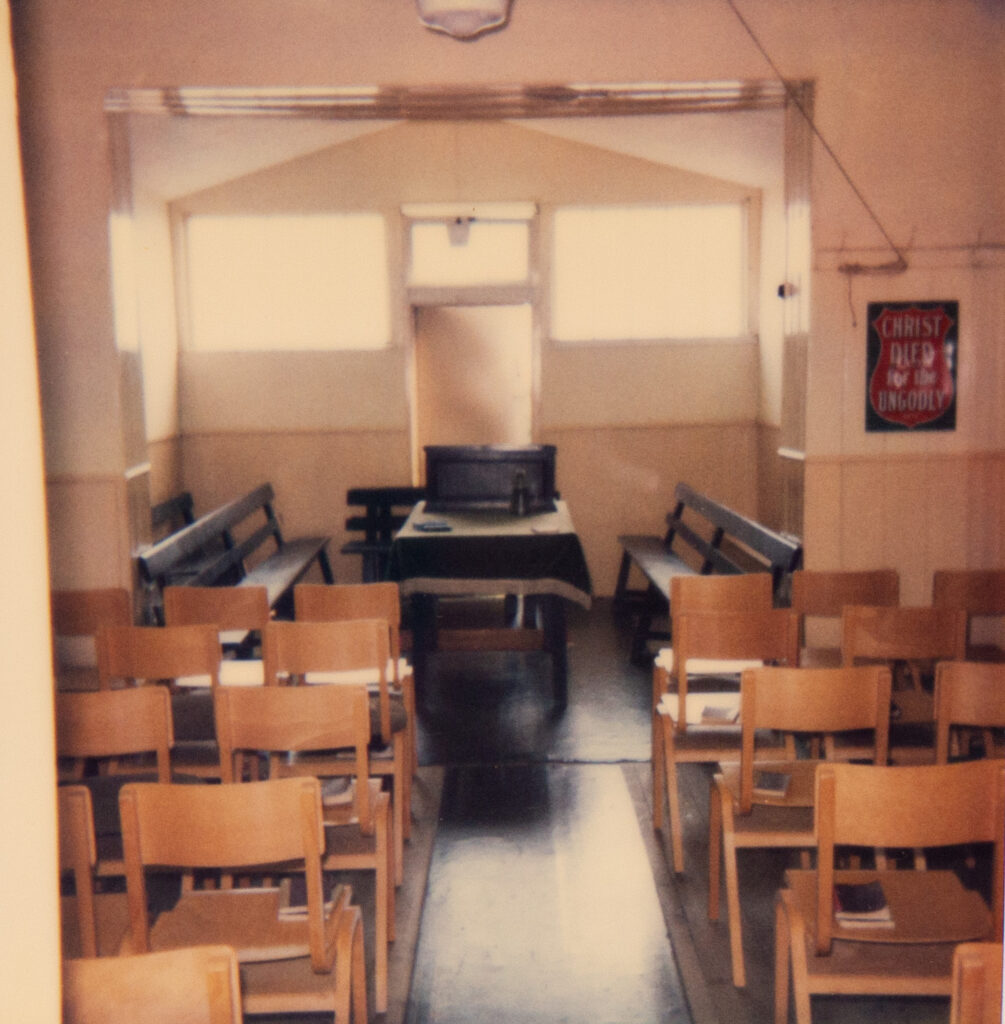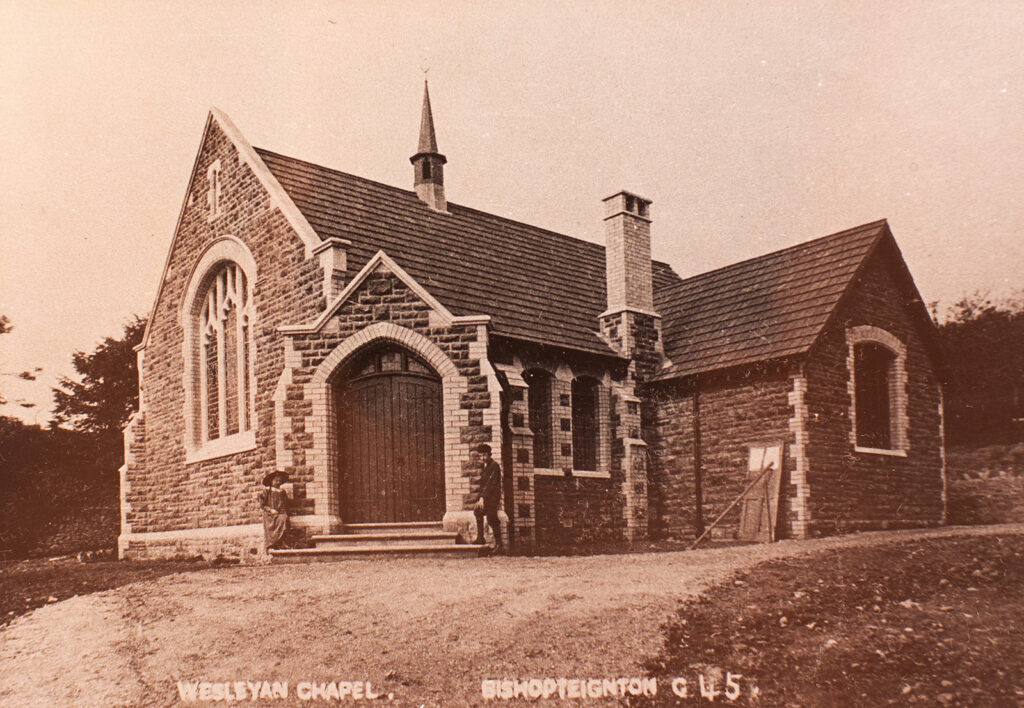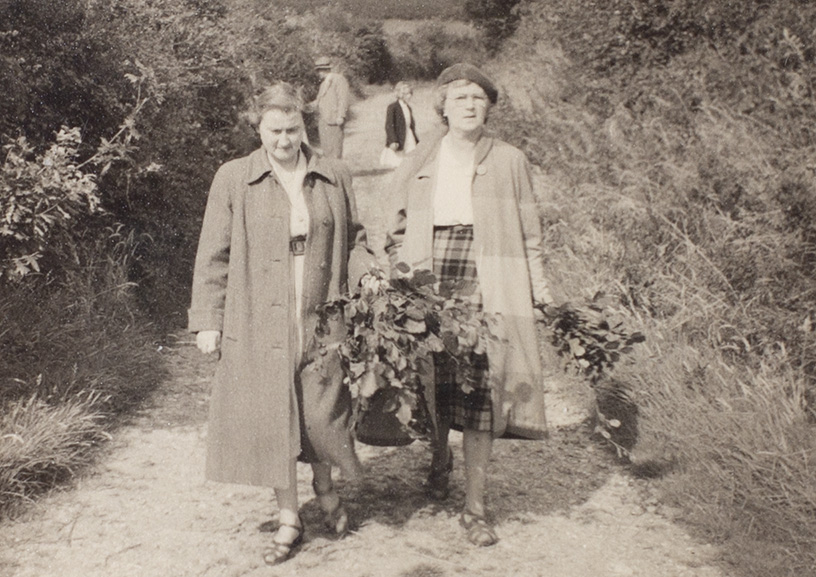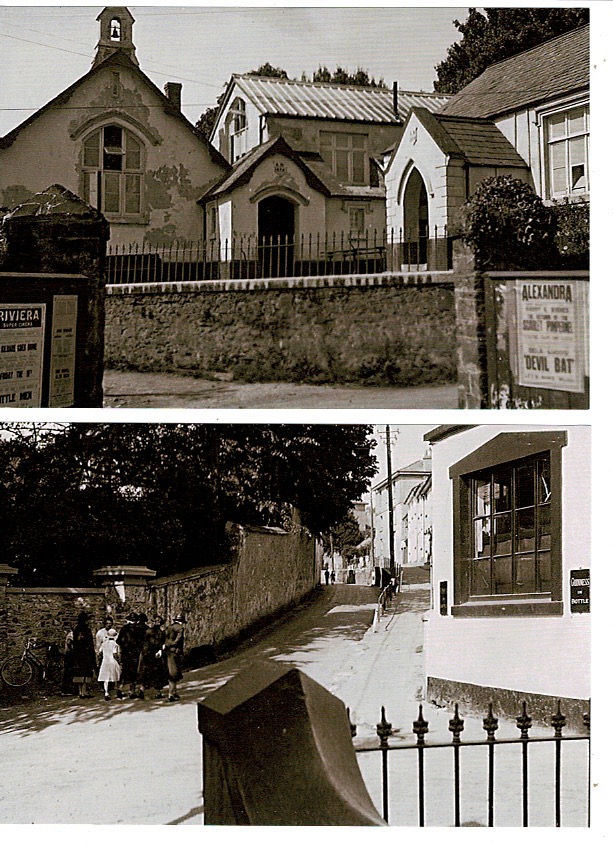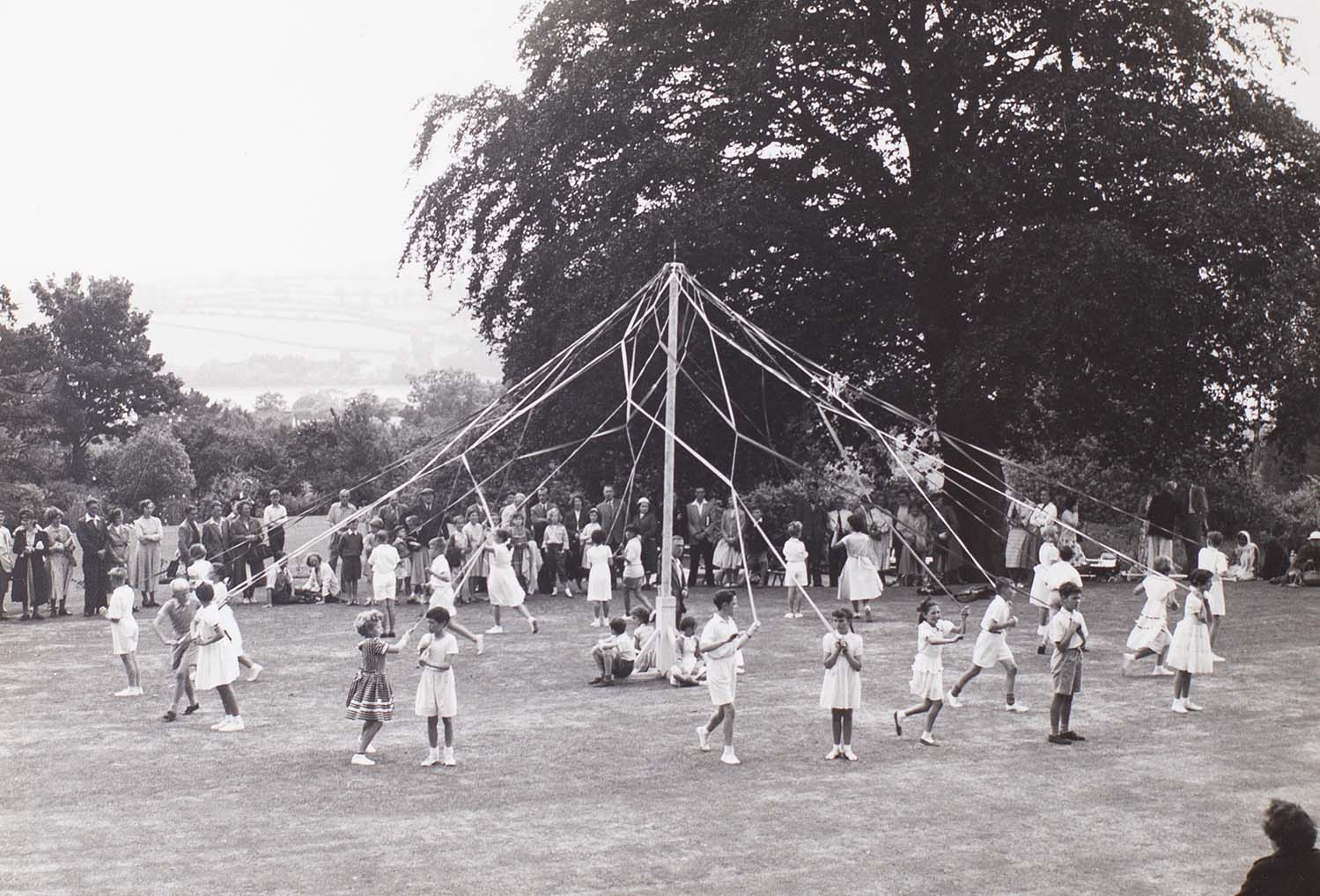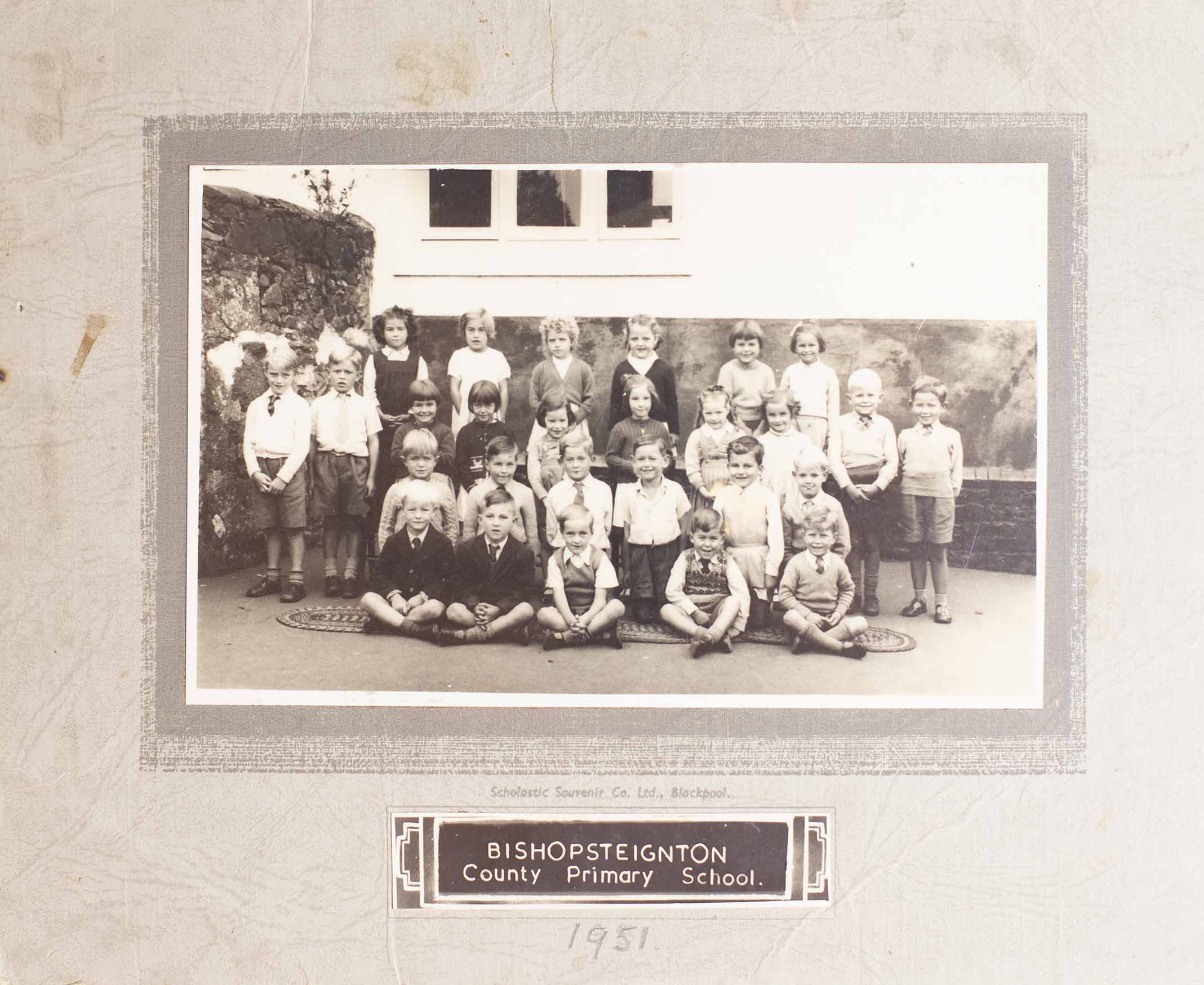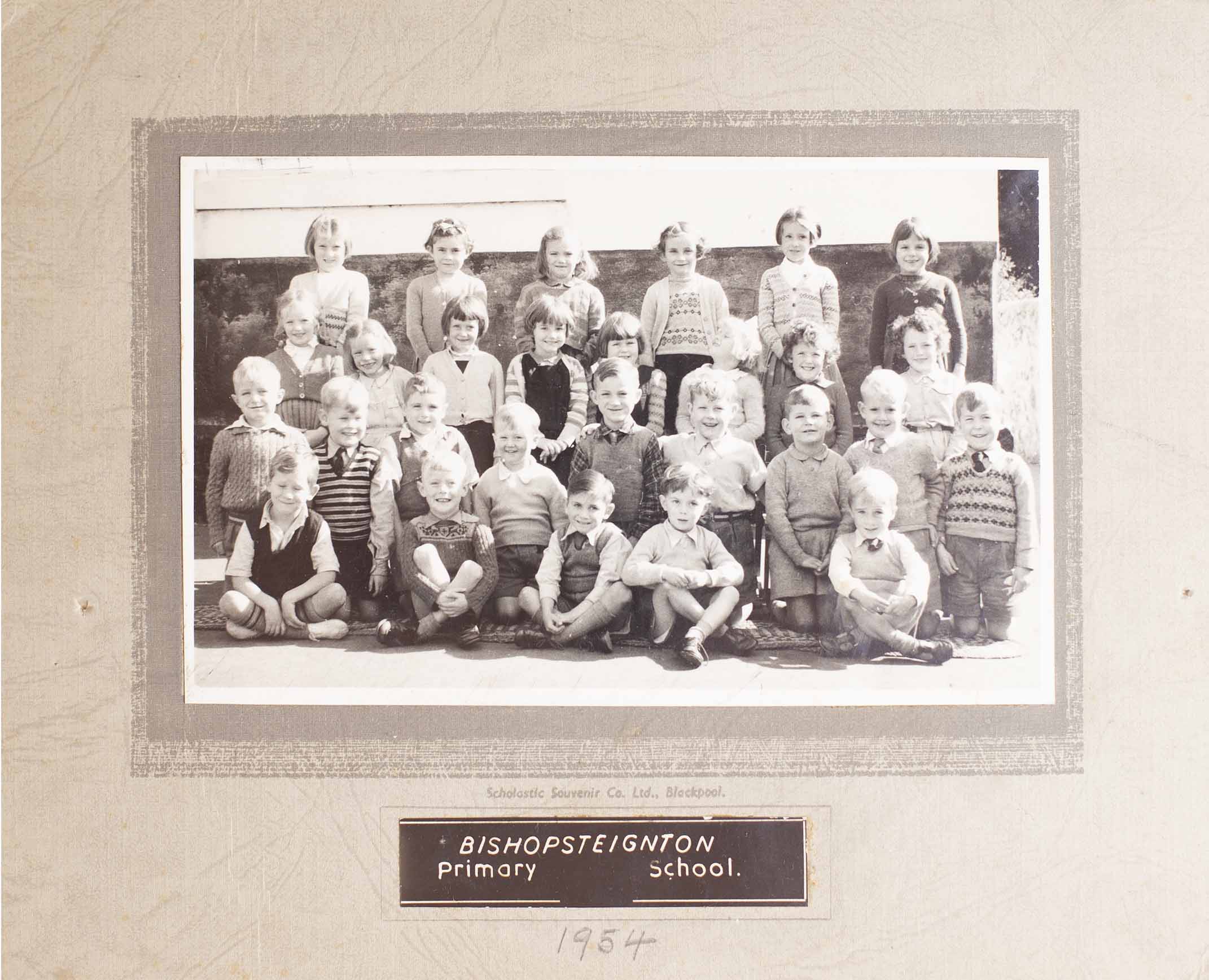Most of the men in the village grew produce for their families. If they did not have a garden then a corner of a field would do or like my father, many had an allotment in Forder Lane. As well as vegetables for every season, many of the men also grew rows of Sweet Peas and Chrysanthemums. The fenced off allotments were at the top end of the field and Bishopsteignton football pitch took up the front part. The field belonged to the grounds of ‘Murley Grange’. One had to be careful going in and out the main gate from the road and to keep the allotment gate closed as a resident horse shared the football pitch area.
The pitch slanted a bit and the ground had a few waves in it but nobody seemed to mind. The occasional sheep helped to keep the grass short. The footballers changing room and baths were at the at the back of the ‘Manor Inn’. My mother, with Mrs Bailey, Mrs Thompson and Mrs Apps (three from Clanage Street) washed the football kits (no washing machines) and kept the team looking smart. I had the job of cleaning my brother’s boots and the ball with Dubbin, a horrible smelly greasy substance, back in those days it was petty disgusting stuff.
I was never into football, but I went to watch them once when the team moved to a field at Colway Cross to play, a young Steve Shambrook kicked the ball that caught me straight in the face leaving me with a lovely black eye. I did okay though as Steve had a collection from both teams. I was given £1. 2s. 6d; compensation for my black eye and indignity. I never watched them again, except when they played a cup game in Newton Abbot and nearly every Bishop family turned out to watch: Mums, Dads and kids. There was no choice.
We ate fresh vegetables according to the season and my mother would dry, salt or pickle some to use through the winter. My father would hang onions and preserve potatoes in a sort of sawdust mixture to take us through the coldest season. In spring and summer mum would preserve fruit and make jams. The ingredients were often what we had picked wild, such as blackberries. We usually had apples given to us or used what was in uncle’s orchard. We had to be careful, as many of his trees were cider apples. Toward the end of the autumn, she would make pickles and chutneys ready for the winter and pickle beetroot and special onions ready for Christmas. Fruit was only available in the shops according to the seasons.
“…many of his trees were cider apples…”
The men mostly attended to the allotments on a Saturday or Sunday morning. My father chose Sundays and we kid’s had a choice, help dad with the allotment or help mum with cleaning and polishing, one or the other. There was no playing outside on a Sunday. After dad got home from working on the allotment, he would send us to the Manor Inn (licensees Mr & Mrs Osborne) with a glass jug to fetch a pint and a half of beer shandy. He would let us kids have a very small a glass and then the rest he enjoyed with his Sunday Dinner.
After Sunday lunch, we went to Sunday school. For a very short while, we went to St John the Baptist Church, Miss Brothwood who lived opposite Wear Farm was our Sunday school teacher. Later we attended The Gospel Hall (Plymouth Brethren), just a couple of doors from home. Mr Counter was our teacher; it was small, warm and friendly.
Mr & Mrs Counter were very good to the children. During the summer, they took our Sunday school for a day trip by coach to Goodrington Sands. The day included jam or fish paste sandwiches, cake and an ice cream. There were games on the beach and a short trip in a boat before returning home tired but very excited.
Twice during the year, they would have the older five or six children to tea at their home in Teign View Terrace. There was a lovely spread of ham sandwiches, cheese sandwiches, homemade cakes, jelly and blancmange with plenty of orange squash. After tea, there was a prayer and then Mrs Counter would play the piano before we made our way home.
Near Christmas Mr & Mrs Counter would lay on another spread, using the Methodist Church Hall. Mums and other family attended and there were paper hats for everyone. The Sunday school children would line up on a raised dais to recite the biblical verse or verses, that they had been given to learn, the recitations were followed with a little gift for each Sunday school child of a little book with stories of Jesus and children across the world. The afternoon was brought to a close, with Mr Counter lifting a giant wooden teapot and tipping into the hands of each child a large fresh Jaffa orange, such happy days.
If the weather was good, my parents would meet us from Sunday school to go for a walk. We would see many families out for a Sunday stroll. My father’s idea of a walk sometimes went on for miles, but nobody complained. My father created a lot of interest when he talked about nature and how to look after the countryside. We picked nuts and fruit as we walked.
“My father created a lot of interest when he talked about nature and how to look after the countryside.”
We could walk up through the fields from Teign View Terrace and come out on Haldon, walk across the top and down the hill to Dawes farm and home. Sometimes we kept on walking over the Haldon crossroads, which took us the back way into Dawlish calling at my aunt’s for tea before catching the bus home. Sometimes we would go the other way and walk to Colway Cross or Humber and the back way into Kingsteignton. We always slept well after a Sunday walk.
All too soon, the weekend was over, and we were back to school. The school opposite the ‘Ring of Bells’ was where I started my formal education. From a small child’s perspective, the building seemed enormous. There were no introductions, just taken to the gate, sent in and mum disappeared. It was a little scary, as it seemed so noisy in the yard. British Bulldogs was a popular game that seemed to add to the mayhem. A whistle sounded at the start of school or at the end of playtime and everyone lined up according to which class one was in. Straight lines were obligatory and no fidgeting, these had to be achieved before moving indoors.
We started in Miss Hawkins class, she taught us all the basics and if we did well, one could earn some sweets. She was a kind and gentle with infinite patience. On a Friday just before close of school, she would play the piano for us to sing. Miss Hawkins had also taught my father. She travelled every day from Kingsteignton.
Miss Hawkins also ran a savings scheme for children using the ‘National Savings Stamps’, we could buy them on a Monday at school, when we paid our lunch money. Miss Hawkins took the money to the post office. It was 6d for a stamp with a picture of Princess Anne or 2/6d for one with Prince Charles.
As we got a little older, Miss Hawkins selected some children to learn ‘Maypole Dancing’ this was practised on the back lawn of Cross House, next to the school. We would perform at The British Legion Fete, Huntley each year, complete with ‘wind up gramophone’. Our team also performed once at the Church Fete held in the grounds of the Old Vicarage and once at the beautiful Murley Grange. The front lawn of the Grange is where our annual school sports day was held. Sometimes Miss Wilson would help with the Maypole dancing.
Each year the Maypole received a fresh coat of paint by Mr Witheridge who proudly wheeled it through the village on his handcart. Mr Witheridge had a workshop at the back of our house before moving to an outbuilding just inside the big gates to ‘Clanage House’.
The next stage in our education was a flight of steps up to Miss Wilson’s room. She appeared to be a tall quite imposing lady but younger than the other teachers. I can remember her dressed in tweed skirts, twinsets and thick brown patterned stockings. At the end of playtime, she was the one with the loudest whistle and voice when calling us all to order. She spoke with what we children considered a strange accent. She was Welsh.
We were not in her class long before moving to be taught in the new school ‘Canteen’ at the top of Radway Hill. We had a new teacher, Mr Bolt. He was not with us long before Mr Westwood took over. A smallish man with a moustache, he had a different way of teaching and soon captured the imaginations of our class through drama and poetry mixed into the main lessons.
Our day started with assembly in Miss Robinson’s room and then our class walked to the ’Canteen’. Just before lunch we had to clear the room for Mrs Honey, the school cook and her helpers to lay the tables for lunch, sometimes we helped. The other children would then arrive from the school. Miss Ann sometimes walked the children from school to the canteen and sometimes she was at the gate to see children cross the road at the end of the school day. After lunch and a short time to play, we resumed our schoolwork.
The final part of our schooling was with ‘Head Mistress’ Miss Robinson. There was a mixture of fear and anticipation, as we knew this was an important time, which would lead to the 11+ exam. The room was big and Miss Robinson could be strict, she did not smile a great deal. She was however a brilliant teacher; one stern look would command silence.
What she taught us and how she taught us was an excellent grounding for all our future education. She always gave a warm welcome if any of the old pupils took the time to pop back to see her. She was always interested in how we were doing in the big wide world.
Miss Robinson did have a humorous side, but not too much at a time. I remember when she was introducing a radio programme into part of our education. It was called “Music and Movement” she nearly and I mean nearly, broke into a laugh as she tried to demonstrate to us, how to move like a tree! Now and again, Miss Robinson would read to us, usually on a Friday afternoon before going home time. She had a brilliant reading voice and the room would be in total silence as she brought the book to life. I remember her reading to us ‘The Kon-Tiki Expedition’ and ’Swiss Family Robinson’.
Parents and children alike respected the teachers. The last year with Miss Robinson before going on to Secondary education was not only about learning it was about preparing us for our futures, she knew we were growing up and she cared. I will always be grateful to Miss Robinson and the other teachers at our village school.
Three things I disliked at school was the little bottles of milk in the summer, as there was not a fridge, they were warm and tasted horrible, in the winter it was fine. Once, when the milk deliveries were on strike, we were had small packets of Horlicks tablets instead of the milk, they were great.
Another thing I hated, was the annual visit by the dentist Mr Butcher, (not sure if that was his real name or just his build and attitude), he was scary. Another was the nit nurse, after going through one’s hair she would also examine in and behind one’s ears and up one’s nose. The children in a queue and no privacy when she asked questions or made remarks such as “get your neck washed” or “you can grow potatoes in those ears”, “have you been digging the garden with those nails”. She would be there on the same day as Mr Butcher, together known as ‘double trouble’.
One activity I enjoyed was the ‘Nature Walks’, usually with Miss Wilson. We wandered through the lanes near the farms and Miss Wilson would chat as we walked, she was so knowledgeable. Just inside Miss Robinson’s room was a nature table, we would pick flowers, weeds and greenery to put on display. I remember when older pupil Ken Dawe who lived on a farm gave us a talk about owls and broke open owl pellets to show us skeletons and bits of mice, it was fascinating.
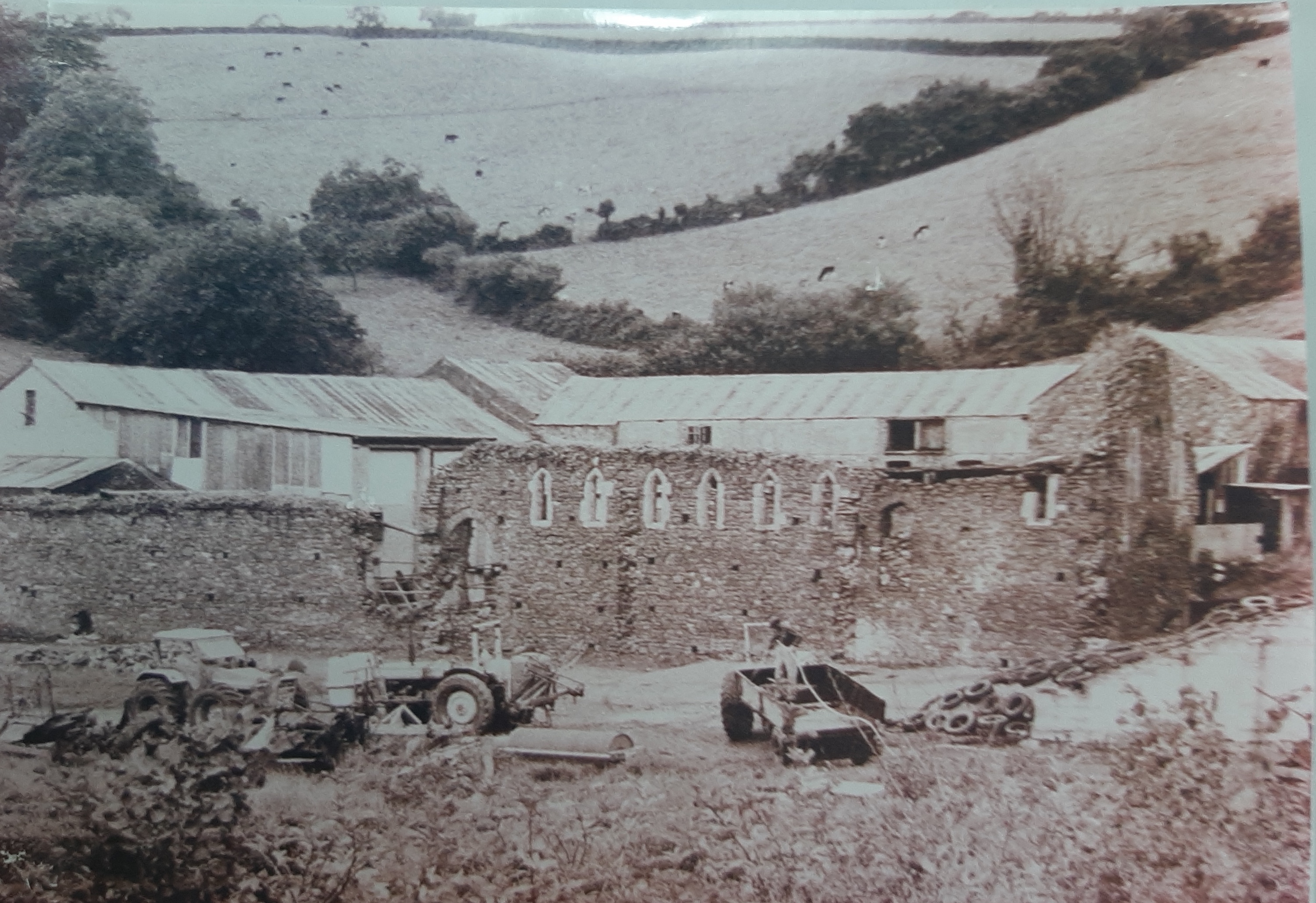
Dawe’s farm, 1987
Colin’s reminiscences are continued in 6 more parts, visit Born and Raised in Bishopsteignton to read more.
Thank you to Colin Back for his stories and to him and Rowena Bradnam for the images.
This article was assembled by Dawn Rogers and the Bishopsteignton Heritage Hub team.
Most of the men in the village grew produce for their families. If they did not have a garden then a corner of a field would do or like my father, many had an allotment in Forder Lane. As well as vegetables for every season, many of the men also grew rows of Sweet Peas and Chrysanthemums. The fenced off allotments were at the top end of the field and Bishopsteignton football pitch took up the front part. The field belonged to the grounds of ‘Murley Grange’. One had to be careful going in and out the main gate from the road and to keep the allotment gate closed as a resident horse shared the football pitch area.
The pitch slanted a bit and the ground had a few waves in it but nobody seemed to mind. The occasional sheep helped to keep the grass short. The footballers changing room and baths were at the at the back of the ‘Manor Inn’. My mother, with Mrs Bailey, Mrs Thompson and Mrs Apps (three from Clanage Street) washed the football kits (no washing machines) and kept the team looking smart. I had the job of cleaning my brother’s boots and the ball with Dubbin, a horrible smelly greasy substance, back in those days it was petty disgusting stuff.
I was never into football, but I went to watch them once when the team moved to a field at Colway Cross to play, a young Steve Shambrook kicked the ball that caught me straight in the face leaving me with a lovely black eye. I did okay though as Steve had a collection from both teams. I was given £1. 2s. 6d; compensation for my black eye and indignity. I never watched them again, except when they played a cup game in Newton Abbot and nearly every Bishop family turned out to watch: Mums, Dads and kids. There was no choice.
We ate fresh vegetables according to the season and my mother would dry, salt or pickle some to use through the winter. My father would hang onions and preserve potatoes in a sort of sawdust mixture to take us through the coldest season. In spring and summer mum would preserve fruit and make jams. The ingredients were often what we had picked wild, such as blackberries. We usually had apples given to us or used what was in uncle’s orchard. We had to be careful, as many of his trees were cider apples. Toward the end of the autumn, she would make pickles and chutneys ready for the winter and pickle beetroot and special onions ready for Christmas. Fruit was only available in the shops according to the seasons.
“…many of his trees were cider apples…”
The men mostly attended to the allotments on a Saturday or Sunday morning. My father chose Sundays and we kid’s had a choice, help dad with the allotment or help mum with cleaning and polishing, one or the other. There was no playing outside on a Sunday. After dad got home from working on the allotment, he would send us to the Manor Inn (licensees Mr & Mrs Osborne) with a glass jug to fetch a pint and a half of beer shandy. He would let us kids have a very small a glass and then the rest he enjoyed with his Sunday Dinner.
After Sunday lunch, we went to Sunday school. For a very short while, we went to St John the Baptist Church, Miss Brothwood who lived opposite Wear Farm was our Sunday school teacher. Later we attended The Gospel Hall (Plymouth Brethren), just a couple of doors from home. Mr Counter was our teacher; it was small, warm and friendly.
Mr & Mrs Counter were very good to the children. During the summer, they took our Sunday school for a day trip by coach to Goodrington Sands. The day included jam or fish paste sandwiches, cake and an ice cream. There were games on the beach and a short trip in a boat before returning home tired but very excited.
Twice during the year, they would have the older five or six children to tea at their home in View Terrace. There was a lovely spread of ham sandwiches, cheese sandwiches, homemade cakes, jelly and blancmange with plenty of orange squash. After tea, there was a prayer and then Mrs Counter would play the piano before we made our way home.
Near Christmas Mr & Mrs Counter would lay on another spread, using the Methodist Church Hall. Mums and other family attended and there were paper hats for everyone. The Sunday school children would line up on a raised dais to recite the biblical verse or verses, that they had been given to learn, the recitations were followed with a little gift for each Sunday school child of a little book with stories of Jesus and children across the world. The afternoon was brought to a close, with Mr Counter lifting a giant wooden teapot and tipping into the hands of each child a large fresh Jaffa orange, such happy days.
If the weather was good, my parents would meet us from Sunday school to go for a walk. We would see many families out for a Sunday stroll. My father’s idea of a walk sometimes went on for miles, but nobody complained. My father created a lot of interest when he talked about nature and how to look after the countryside. We picked nuts and fruit as we walked.
“My father created a lot of interest when he talked about nature and how to look after the countryside.”
We could walk up through the fields from Teign View Terrace and come out on Haldon, walk across the top and down the hill to Dawes farm and home. Sometimes we kept on walking over the Haldon crossroads, which took us the back way into Dawlish calling at my aunt’s for tea before catching the bus home. Sometimes we would go the other way and walk to Colway Cross or Humber and the back way into Kingsteignton. We always slept well after a Sunday walk.
All too soon, the weekend was over, and we were back to school. The school opposite the ‘Ring of Bells’ was where I started my formal education. From a small child’s perspective, the building seemed enormous. There were no introductions, just taken to the gate, sent in and mum disappeared. It was a little scary, as it seemed so noisy in the yard. British Bulldogs was a popular game that seemed to add to the mayhem. A whistle sounded at the start of school or at the end of playtime and everyone lined up according to which class one was in. Straight lines were obligatory and no fidgeting, these had to be achieved before moving indoors.
We started in Miss Hawkins class, she taught us all the basics and if we did well, one could earn some sweets. She was a kind and gentle with infinite patience. On a Friday just before close of school, she would play the piano for us to sing. Miss Hawkins had also taught my father. She travelled every day from Kingsteignton.
Miss Hawkins also ran a savings scheme for children using the ‘National Savings Stamps’, we could buy them on a Monday at school, when we paid our lunch money. Miss Hawkins took the money to the post office. It was 6d for a stamp with a picture of Princess Anne or 2/6d for one with Prince Charles.
As we got a little older, Miss Hawkins selected some children to learn ‘Maypole Dancing’ this was practised on the back lawn of Cross House, next to the school. We would perform at The British Legion Fete, Huntley each year, complete with ‘wind up gramophone’. Our team also performed once at the Church Fete held in the grounds of the Old Vicarage and once at the beautiful Murley Grange. The front lawn of the Grange is where our annual school sports day was held. Sometimes Miss Wilson would help with the Maypole dancing.
Each year the Maypole received a fresh coat of paint by Mr Witheridge who proudly wheeled it through the village on his handcart. Mr Witheridge had a workshop at the back of our house before moving to an outbuilding just inside the big gates to ‘Clanage House’.
The next stage in our education was a flight of steps up to Miss Wilson’s room. She appeared to be a tall quite imposing lady but younger than the other teachers. I can remember her dressed in tweed skirts, twinsets and thick brown patterned stockings. At the end of playtime, she was the one with the loudest whistle and voice when calling us all to order. She spoke with what we children considered a strange accent. She was Welsh.
We were not in her class long before moving to be taught in the new school ‘Canteen’ at the top of Radway Hill. We had a new teacher, Mr Bolt. He was not with us long before Mr Westwood took over. A smallish man with a moustache, he had a different way of teaching and soon captured the imaginations of our class through drama and poetry mixed into the main lessons.
Our day started with assembly in Miss Robinson’s room and then our class walked to the ’Canteen’. Just before lunch we had to clear the room for Mrs Honey, the school cook and her helpers to lay the tables for lunch, sometimes we helped. The other children would then arrive from the school. Miss Ann sometimes walked the children from school to the canteen and sometimes she was at the gate to see children cross the road at the end of the school day. After lunch and a short time to play, we resumed our schoolwork.
The final part of our schooling was with ‘Head Mistress’ Miss Robinson. There was a mixture of fear and anticipation, as we knew this was an important time, which would lead to the 11+ exam. The room was big and Miss Robinson could be strict, she did not smile a great deal. She was however a brilliant teacher; one stern look would command silence.
What she taught us and how she taught us was an excellent grounding for all our future education. She always gave a warm welcome if any of the old pupils took the time to pop back to see her. She was always interested in how we were doing in the big wide world.
Miss Robinson did have a humorous side, but not too much at a time. I remember when she was introducing a radio programme into part of our education. It was called “Music and Movement” she nearly and I mean nearly, broke into a laugh as she tried to demonstrate to us, how to move like a tree! Now and again, Miss Robinson would read to us, usually on a Friday afternoon before going home time. She had a brilliant reading voice and the room would be in total silence as she brought the book to life. I remember her reading to us ‘The Kon-Tiki Expedition’ and ’Swiss Family Robinson’.
Parents and children alike respected the teachers. The last year with Miss Robinson before going on to Secondary education was not only about learning it was about preparing us for our futures, she knew we were growing up and she cared. I will always be grateful to Miss Robinson and the other teachers at our village school.
Three things I disliked at school was the little bottles of milk in the summer, as there was not a fridge, they were warm and tasted horrible, in the winter it was fine. Once, when the milk deliveries were on strike, we were had small packets of Horlicks tablets instead of the milk, they were great.
Another thing I hated, was the annual visit by the dentist Mr Butcher, (not sure if that was his real name or just his build and attitude), he was scary. Another was the nit nurse, after going through one’s hair she would also examine in and behind one’s ears and up one’s nose. The children in a queue and no privacy when she asked questions or made remarks such as “get your neck washed” or “you can grow potatoes in those ears”, “have you been digging the garden with those nails”. She would be there on the same day as Mr Butcher, together known as ‘double trouble’.

Dawe’s farm, 1987
One activity I enjoyed was the ‘Nature Walks’, usually with Miss Wilson. We wandered through the lanes near the farms and Miss Wilson would chat as we walked, she was so knowledgeable. Just inside Miss Robinson’s room was a nature table, we would pick flowers, weeds and greenery to put on display. I remember when older pupil Ken Dawe who lived on a farm gave us a talk about owls and broke open owl pellets to show us skeletons and bits of mice, it was fascinating.
Colin’s reminiscences are continued in 6 more parts, visit Born and Raised in Bishopsteignton to read more.
Thank you to Colin Back for his stories and to him and Rowena Bradnam for the images.
This article was assembled by Dawn Rogers and the Bishopsteignton Heritage Hub team.

